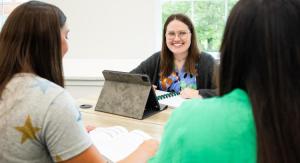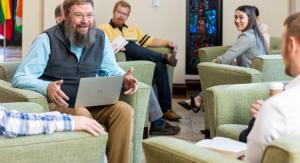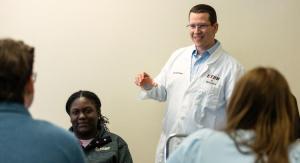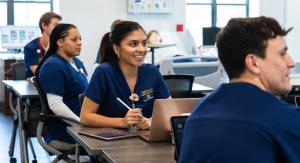Dr. Ana Paula Mumy
Program Director
The MS in Speech-Language Pathology is a 54-credit hour program consisting of 36 hours of academic coursework and 18 hours of clinical practicums. The academic coursework may be taught in face-to-face, online, or hybrid formats determined primarily by the availability of instructors and their areas of expertise. The program will be taught in a two-academic year timeframe (22 months), including two fall semesters, a summer semester with two terms, and two spring semesters.
The Master of Science (M.S.) education program in speech-language pathology (residential) at East Texas Baptist University is a Candidate for Accreditation by the Council on Academic Accreditation in Audiology and Speech-Language Pathology (CAA) of the American Speech-Language-Hearing Association, 2200 Research Boulevard, #310, Rockville, MD 20850, 800-498-2071 or 301-296-5700. Candidacy is a “pre-accreditation” status with the CAA, awarded to developing or emerging programs for a maximum period of 5 years.
GRADUATE ADMISSIONS INFORMATION
Cost | Admission Requirements | Transfer of Credit
NEXT STEPS
Request Information
Apply Now
STUDENT ACHIEVEMENT DATA
View Student Achievement Data
LEVELING TRACK
Read about the MS-SLP Leveling Track
Courses
Fall Semester | Year One
SPLP 5305 (3 hours) Diagnostics and Report Writing
SPLP 5308 (3 hours) Language Disorders in Children
SPLP 5311 (3 hours) Speech Sound Disorders
SPLP 5101 (1 hour) Clinical Methods
SPLP 5351 (3 hours) Clinical Practicum I
Spring Semester | Year One
SPLP 5302 (3 hours) Adult Cognitive-Linguistic Disorders
SPLP 5307 (3 hours) Stuttering and Cluttering
SPLP 5310 (3 hours) Evidence-Based Practice
SPLP 5102 (1 hour) Counseling Skills
SPLP 5352 (3 hours) Clinical Practicum II
Summer Term I | Year One
SPLP 5201 (2 hours) Augmentative and Alternative Communication
SPLP 5353 (3 hours) Clinical Practicum III
Summer Term II | Year One
SPLP 5203 (2 hours) Special Populations
SPLP 5312 (3 hours) Voice and Related Disorders
Fall Semester | Year Two
SPLP 5306 (3 hours) Dysphagia
SPLP 5309 (3 hours) Motor Speech Disorders
SPLP 5103 (1 hour) Ethics and Professional Issues
SPLP 5202 (2 hours) A Christian View on Disability
SPLP 5354 (3 hours) Clinical Practicum IV
Spring Semester | Year Two
SPLP 5651 (6 hours) Clinical Externship
Program Mission Statement
The mission of the Master of Science in Speech-Language Pathology (MS SLP) program is to contribute to the University’s mission through equipping students called to the field of speech-language pathology with the competence and confidence to help families and individuals across the lifespan and from diverse backgrounds, facing the impact of communication, cognitive, and swallowing disorders as well as communication differences. We promote the personal, spiritual, and professional development of students through faculty engagement and mentoring while emphasizing a Christ-centered worldview, compassionate care, Christian servant leadership, professionalism, cultural competence, advocacy, ethical accountability and integrity, interprofessional collaboration, and lifelong learning.
Program Goals and Objectives
The goal of the MS SLP Program is to prepare graduate students to be competent, confident, ethical, and compassionate speech-language pathologists in a variety of educational and healthcare settings, equipping students with relevant knowledge, skills, and procedures required for clinical practice, promoting professional practice, research, and diversity.
The MS SLP program and course of study are organized to meet the following objectives:
- To provide students the opportunity to develop a comprehensive knowledge and corresponding clinical skills in the nine core areas of articulation, fluency, voice and resonance, receptive and expressive language, hearing, swallowing, cognitive aspects of communication, social aspects of communication, and augmentative and alternative communication. This includes ensuring students acquire the following:
- Professional practice competencies that demonstrate accountability, effective communication skills, evidence-based practice, and professional duty, as set forth in the CAA standards for accreditation (https://caa.asha.org/reporting/standards/).
- Foundations of speech-language pathology practice through knowledge of the discipline of human communication sciences and disorders, the nature of human communication and swallowing processes, and normal and abnormal human development across the lifespan, including the appropriate biological, neurological, acoustic, psychological, developmental, and linguistic and cultural bases.
- Knowledge of the principles and methods of identification and prevention of speech, language, and swallowing disorders and differences.
- Knowledge and skills of assessment of speech, language, and swallowing disorders and differences and intervention to minimize the impact of speech, language, and swallowing disorders and differences, including the ability to integrate, synthesize and apply classroom knowledge with their diverse clinical experiences.
- Knowledge and skills in working with individuals with communication and swallowing disorders across the lifespan and demonstration of 1) ethical conduct; 2) integration and application of knowledge of the interdependence of speech, language, and hearing; 3) engagement in contemporary professional issues and advocacy; 4) engagement in self-assessment over the duration of the program to improve effectiveness in the delivery of clinical services; 5) clinical education and supervision; 6) clinical counseling skills appropriate to the individual, family members, caregivers, and others involved in care; 7) professionalism and professional behavior that is reflective of cultural and linguistic differences; 8) interaction skills and interpersonal qualities, including counseling and collaboration; and 9) ability to work effectively as a member of an interprofessional team.
- Skills in oral and written communication and other forms of communication sufficient to achieve effective clinical and professional interaction with persons receiving services and relevant others, including writing and comprehending technical reports, diagnostic and treatment reports, treatment plans, and professional correspondence.
- Cultural competence in service delivery, including the identification and acknowledgment of the impact of one’s own cultural and linguistic variables and biases on clinical service delivery, as well as the impact and interaction of cultural and linguistic variables of the individuals/families served on clinical service delivery.
- Knowledge of the scientific bases of the profession, research methodologies, fundamentals of evidence-based practice, and application of the scientific bases and research principles to clinical populations served.
- To ensure students have access to quality clinical supervision and obtain comprehensive clinical experiences with diverse clients, including a variety of clinical settings, populations, and age groups, during practicum and externship experiences, culminating in a minimum of 400 clock hours of supervised clinical experience in the practice of speech-language pathology.
- To ensure students know the expectations regarding their exercise of the highest level of academic and clinical integrity during all aspects of their education.
- To provide opportunities for students to participate in community involvement and development through social and educational experiences.
Program-Specific Policy on Dismissal from Program:
- Students who fail to maintain at least a 3.0 cumulative grade point average will be placed on academic probation and will be required to earn a minimum semester grade point average of 3.0 or above in subsequent semesters until the cumulative grade point deficiency is removed. Failure to attain at least a 3.0 semester grade point average may result in dismissal from the program.
- Receipt of two or more grades of C or below in academic or clinical courses is grounds for dismissal from the program.
- Intervention may be needed mid-course (academic or clinic course enrollment) or after receiving a course grade of C or below. A detailed intervention plan for remediation must be developed by the appropriate academic or clinical instructor and the student’s academic advisor in conjunction with the student.
- Students who earn a grade of D or F in any one course may be dismissed from the program based on a recommendation from the Program Director and Dean.
Graduation Requirements
Students will be cleared to graduate only after they have completed all degree requirements, including the following:
- Complete a total of 54 graduate credit hours, maintaining at least a 3.0 cumulative grade point average.
- Complete a minimum of 400 clock hours of supervised clinical experiences in the practice of speech-language pathology with satisfactory ratings from all clinical supervisors. Twenty-five hours must be spent in clinical observation, and 375 hours must be spent in direct client/patient contact. At least 325 of the 400 clock hours must be completed at the graduate level.
- Completion of the Knowledge and Skills Acquisition (KASA) form with each competency marked as acquired and certified by the Program Director.
- Pass the final Comprehensive Examination (summative assessment).












